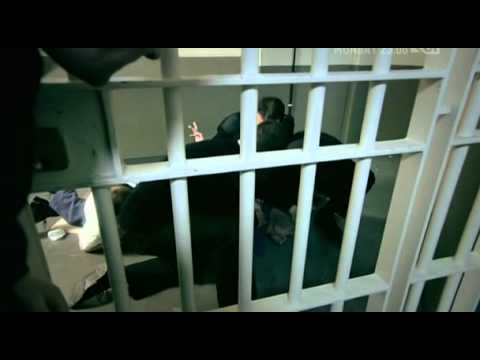In the annals of Britain’s criminal history, few names evoke such a mix of fear, fascination, and bewilderment as that of Charles Bronson. The gripping documentary, “Charles Bronson: Britain’s Hardest Man,” delves into the enigmatic life of this notorious figure, renowned as one of the country’s most brutal criminals. From his initial conviction in 1974 for armed robbery to his perpetual cycle of violence and imprisonment, the film unravels the complexities surrounding this larger-than-life character.
Bronson’s descent into a life of crime began with his seven-year sentence for armed robbery, but little did anyone anticipate the explosive path he would forge within the prison walls. Displaying a propensity for aggression, he soon garnered a reputation as a loose cannon, engaging in frequent clashes with fellow inmates and prison staff. Each violent altercation only served to compound his sentence, leading to a staggering fourteen-year term and a life marked by isolation.
The documentary meticulously traces Bronson’s tumultuous journey through the corridors of Her Majesty’s Prison Service, where he was shuffled between institutions a staggering 120 times. Solitary confinement became his perpetual home, a stark existence that offered little respite from his own inner demons. As the years wore on, his original seven-year sentence expanded like a twisted echo, entailing devastating consequences that reverberated far beyond the prison walls.
Yet, behind the indomitable force of Bronson’s persona lies a complex web of factors that contributed to his transformation into Britain’s most notorious inmate. The film sheds light on the series of events that propelled him further down the path of violence, unearthing the layers of his troubled psyche and the personal struggles that fueled his relentless aggression.
Intertwined with Bronson’s narrative are the shattered relationships left in his wake. His first wife, Irene, unable to endure the repercussions of his prolonged imprisonment and the unyielding chaos that surrounded his life, ultimately made the painful decision to leave. Such was the indomitable grip of Bronson’s tumultuous existence that even brief moments of freedom proved ephemeral, as he found himself arrested a mere sixty-nine days after his release in 1988.
“Charles Bronson: Britain’s Hardest Man” offers an unflinching portrayal of a man who has become an emblem of society’s darkest corners. Through interviews with key individuals who have encountered him, including prison guards, former inmates, and psychologists, the documentary pieces together a multifaceted portrait of a figure shrouded in myth and infamy.
While Bronson’s story may be one of extreme violence and disruption, it also invites contemplation of the broader issues within the criminal justice system. The film raises thought-provoking questions about the efficacy of incarceration as a means of rehabilitation and the complexities surrounding the management of individuals with profound psychological challenges.
In recounting the life and exploits of Charles Bronson, the documentary prompts introspection into the societal factors that mold individuals and the capacity for redemption within a system plagued by recurring cycles of violence. It forces viewers to confront uncomfortable truths about the boundaries of human resilience, the potential for transformation, and the ever-present shadows lurking within the darkest corners of society.
“Charles Bronson: Britain’s Hardest Man” leaves an indelible mark on its audience, provoking a mix of emotions ranging from shock and disbelief to a profound sense of unease. It stands as a testament to the enduring power of one man’s tumultuous journey, offering a stark reflection on the consequences of a life consumed by violence and the complex realities of a criminal justice system struggling to contain such formidable forces.

